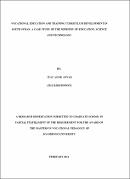| dc.contributor.author | Juac, Agok Anyar | |
| dc.date.accessioned | 2022-02-26T09:41:18Z | |
| dc.date.available | 2022-02-26T09:41:18Z | |
| dc.date.issued | 2014-02 | |
| dc.identifier.citation | Juac, Agok Anyar (2014) Vocational education and training curriculum development in South Sudan: a case study of the ministry of education, science and technology | en_US |
| dc.identifier.uri | https://kyuspace.kyu.ac.ug/xmlui/handle/20.500.12504/709 | |
| dc.description | xv, 80 p. : ill. (some col.) ; | en_US |
| dc.description.abstract | The purpose of this study was to investigate, the status of technical vocational education and
training curriculum development and implementation in South Sudan. The following objectives
guided this study: To find out the steps taken so far by the government to develop TVET
curriculum, to find out the challenges being experienced in making the curriculum, and to
recommend ways of developing TVET curriculum for South Sudan. This research was based on
descriptive survey design. It was following a qualitative approach. The following were the
finding: Government is taking giant steps to address the curriculum problem in South Sudan.
Key challenges hindering curriculum development are lack of capacity, experts, and insufficient
funds. Lack of cooperation among partners/ministries implementing TVET insufficient funding,
and insufficient good reference materials, insufficient number of experts and lack of
policies/guidelines have to be addressed with urgency since these are fundamental issues that
continue to hinder the curriculum development. The researcher recommend need to prioritize
reform ofTVET. This is by developing a unified national curriculum that could offer the chances
of those graduating from TVET and other educational institutions with credible certificates for
employment. The Government of South Sudan needs to suggest new reforms in the education in
general and TVET system in particular, changes within the curricula so as to produce graduates
with knowledge and skills relevant to the changing demands of the labor market. South Sudan
can evade of these problems by putting life skills as part of TVET education curriculum. The
TVET curricula should have both academic and practical learning offeU!d every day and include
modules to allow for maximum flexibility and allow students to move in and out of courses and
build upon their skills in a sequential or appropriate manner. | en_US |
| dc.language.iso | en | en_US |
| dc.publisher | Kyambogo University (un published work) | en_US |
| dc.subject | Vocational education | en_US |
| dc.subject | Training curriculum | en_US |
| dc.subject | Development | en_US |
| dc.subject | Science and technology | en_US |
| dc.title | Vocational education and training curriculum development in South Sudan: a case study of the Ministry of Education, Science and Technology | en_US |
| dc.type | Thesis | en_US |

